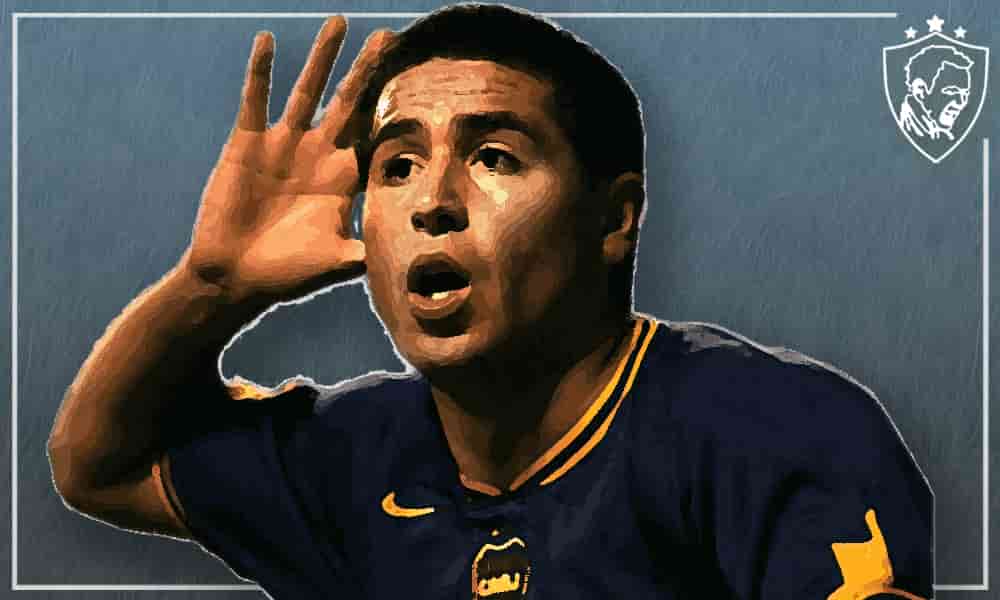Most fans will point to Lionel Messi as the natural heir to Diego Maradona. However, a select number of older fans will appreciate the genius of Juan Roman Riquelme.
Riquelme was the quintessential No. 10 attacking midfielder, with playmaking ability, infinite passing range, and dribbling skills. His career started at Boca Juniors, making his debut in 1996.
He then went on to become a Boca legend, scoring 44 goals during his initial stint, which led him to win two Apertura titles and two Copa Libertadores trophies. He was also voted Argentine footballer of the year in 2000 and 2001. And much like a certain Martin Palermo who had a similar rise to prominence in blue and gold, the stage was set for a move to Europe.
In 2002, he secured a move to Barcelona, who at the time were being managed by the enigmatic Louis van Gaal. Everybody is familiar with van Gaal’s coaching style – strict, blunt, and demanding hard work from his players. Some may say that such approach is suffocating, particularly for players who want to express themselves through flair, trickery, and dynamism, i.e. archetypal No. 10s.
The more recent example of van Gaal’s treatment of Angel Di Maria at Manchester United exemplifies that; when the Argentine was often played out of position and asked to perform duties contrary to his dynamic style.
The relationship between van Gaal and Juan Roman Riquelme was not too dissimilar. It was quite widely known that van Gaal was not the biggest fan of Riquelme due to his perceived “lazy” playing style; who often thrived in an environment when given freedom to express himself at his own pace.
In 2003, Barcelona signed Ronaldinho (and the rest is history), which meant that Riquelme was forced out, partly due to the squad reaching their foreign player quota, but mainly because of the differences with van Gaal.
Juan Roman Riquelme’s renaissance began with Villarreal, where he was sent out on a two-year loan. He was impressive in his first season with the Yellow Submarine, finishing 8th in La Liga. But the best was yet to come.
In 2004, Villarreal appointed Manuel Pellegrini as manager, who helped his fellow South American shape a formidable midfield-to-striking partnership with Marcos Senna and Diego Forlán. Pellegrini understood Riquelme and allowed to him to express himself on the pitch … unlike van Gaal!
Freed from the shackles that once confined him, Juan Roman Riquelme went on to score 16 goals and helped Forlán to reach 25, winning the Pichichi award in the process. This inspiring duo helped Villarreal finish 3rd in the 2004/05 La Liga season, and in 2005/06 they reached the Semi-Finals of the Champions League. Ironic isn’t it, that a pair of discarded talents would find such success elsewhere.
‘One man’s treasure …’ right?
All was going well at club level for Juan, but he was yet to prove himself on the international stage, having been officially christened as Maradona’s heir for his Villarreal form. The 2006 World Cup in Germany was the perfect stage for the Argentine to bring back the glory days his predecessor made look easy.
La Albiceleste managed to produce a noteworthy moment with that Cambiasso goal against Serbia – Juan Roman Riquelme having played a typically pivotal role in the build-up. In fact, he had a pretty impressive tournament as a whole; finishing top for assists.
Yet despite the impressive moments, Argentina crashed out of the Quarter Finals on penalties against Germany, with Riquelme deemed surplus to requirements with twenty minutes to spare. But the fact that his lack of international status tends to taint his overall legacy is beyond me!
His cultured right foot and ingenuity proved to be a powerful weapon when maneuvering in tight spaces.
His vision and killer passes in behind set the blueprint for players like Xavi and Iniesta. Sure, Riquelme may not have lived up to all expectations, but he was part of a technically gifted generation which set the path for those after him.
And if that’s good enough for Lionel Messi, then that’s good enough for me!

Great read!
Great read! Riquelme was a legend on football/championship manager back in the day.